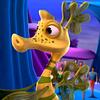Take a photo of a barcode or cover
Pros:
- For the first third of the story, I appreciated the “flowery” language (that’s a pun - if you’ve read this, you know Wilde was quite obsessed with describing the surrounding flora in ever scene. Purposeful? Probably. Useful? Debatable).
- Lord Henry was characterized well, and I think how you interpret his dialogue truly impacts your impression of his character. I read him with a perpetual light-hearted sarcasm, which is to say that I didn’t take a single thing he said seriously. He characterized the shallow Brit exceptionally well, especially when he made his comments about class. He forces you to stop and think, “do I agree with what he’s saying, or is he just speaking with such pomp that I tend to agree with him based solely off of the confidence with which he speaks?”
- The amount of times characters flopped on couches was hilarious to me. They were always flinging themselves to and fro, it really added to the drama of it all.
- Characters descending into true madness is fascinating to me, always.
Cons:
- Where this story fell apart from me was what seems to happen off-page. Wilde focuses so intently on setting or history or flippant dialogue between characters, but doesn’t spend nearly enough time focusing on what Gray is actually DOING. In the latter half, years and years pass by where we are just told that Gray is being a dick - he’s following Lord Henry’s belief system and living a debaucherous life. But we don’t SEE IT, and that’s where Wilde lost me. If you’re going to critique good vs bad, if we are going to debate what makes or breaks a soul, if we are going to have conversations of morality, then let’s actually see the “bad” things he does so we can form our own opinions! Instead, we just have to trust that he’s become vapid and treats people poorly because he is living without physical consequences. That was a huge miss for me.
- For most of the novel, that picture is degrading in the attic off-page. I think it would have been a much more interesting experiment if, every time Gray did something, he ran to go check the portrait. We would have been able to better measure the degradation of his mind as he debated internally about what the painting was telling him. But again, this was missed with the time jumps.
- The gender hypocrisy was very heavy-handed. One could argue that it was purposeful, but given the timeframe that this story was written, I think it is just a reflection of how men actually thought of women. Multiple times, women were characterized as overly romantic, shallow, and vapid. But the ENTIRE STORY centers men who want to do nothing but romanticize their life based off of being beautiful and observing beautiful things.
- Also, trigger warning for blatant antisemitism.
- Was Gray born a narcissist or was he made into one? Either way, this man seriously lacked empathy for others and I don’t know if it can all be blamed on Lord Henry’s influence.
- My favorite character died and that pissed me off.
Maybe I just need to stop reading about privileged men in high British society, because the way they love the sound of their own voice is CRAZY.
Graphic: Addiction, Body horror, Body shaming, Death, Gun violence, Misogyny, Sexism, Blood, Antisemitism, Murder, Toxic friendship, Alcohol, Classism
Graphic: Misogyny
Moderate: Violence, Antisemitism
Graphic: Death, Suicide, Murder
Moderate: Child death, Death, Misogyny, Sexism, Antisemitism
Minor: Body horror, Drug use, Blood
Graphic: Suicide, Toxic relationship, Antisemitism, Murder, Toxic friendship
Graphic: Drug use, Misogyny, Racism, Suicide, Blood, Antisemitism
Graphic: Misogyny, Sexism, Suicide, Antisemitism
Graphic: Misogyny, Antisemitism, Murder, Gaslighting, Toxic friendship, Classism
Graphic: Sexism, Murder
Moderate: Blood, Toxic friendship
Minor: Drug use, Antisemitism
Graphic: Body shaming, Death, Violence, Blood, Murder, Toxic friendship
Moderate: Misogyny, Sexism, Suicide, Toxic relationship, Antisemitism, Classism
Minor: Adult/minor relationship, Racism, Xenophobia
anyway yeah idrk about this one. i annotated the shit out of my copy and yet by page 180 i was more than ready for it to end. i think the fact that the ending was very clearly foreshadowed since like page 3 didn't help keep my interest, but watching dorian gray's moral and psychological decline, as well as his descent into madness (and especially the (in)direct consequences of
i think my biggest grievance with this book was henry's entire character. every time he started monologuing i had to sigh and brace myself for a lot of eye-rolling. obviously he's not meant to be a loveable character but jesus fucking christ dude. SHUT UP. i'm not even sure what bothered me i just needed him to stop ❤️
yeah i wouldn't say this was for me but i'm still glad i finally got around to reading it on my own time. i can still appreciate this classic for what it is and what wilde meant for it to be, and as far as certain themes go he did a splendid job given his contemporary circumstances, but i still believe he was easily at his best when he was being satirical.
Graphic: Murder
Moderate: Misogyny, Suicide, Antisemitism
Minor: Animal death, Drug use









